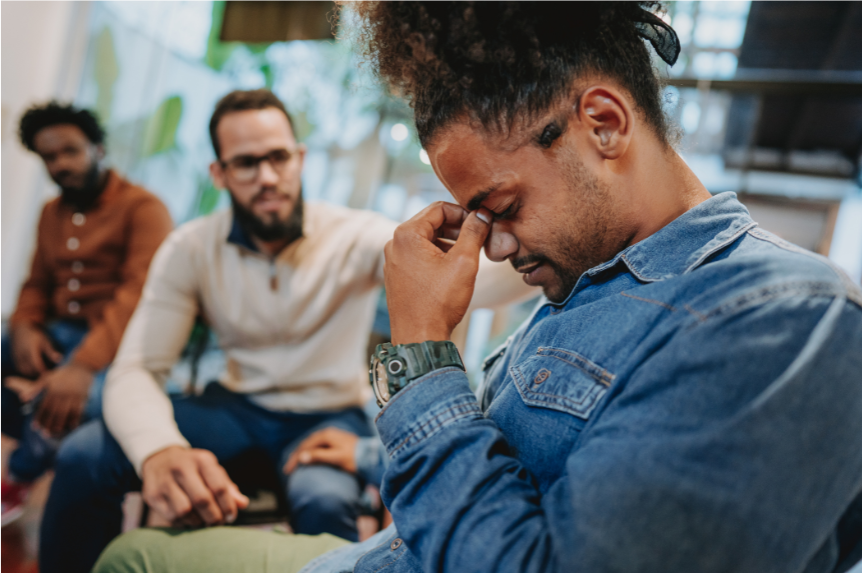How do I know when it's time to get help?
Thanks to Hope Recovery and Healing for this resource.
Life is full of ups and downs, right? All of us have experienced positive feelings and the negative. For example, maybe you get a promotion at work and have a good few weeks of up-beat joy. But then, to your dismay, you find out that one of your relatives has passed away.
Experiencing different emotions on opposite ends of the spectrum is normal and even healthy. However, some may find themselves stuck on the sad side of the spectrum for longer than they feel comfortable with. In addition to feeling depressed, they may find they have a hard time knowing how to get back to feeling happy again.
In this resource, you'll find the answers to these questions:
Is this normal or is something else going on?
Is the thought of therapy a little uncomfortable?
Are there other ways to get help besides therapy?
If I need to get help, does it mean I’m weak?
Is this normal or is something else going on?
Feeling like you’re in a depressed state of mind can last hours, days, weeks, or years.
Some of that is part of the normal ups and downs of life. But how do you know the difference between sadness and depression? Often times, feelings of depression are described as one or more of the following:
- There’s no pleasure or joy in life.
- Concentration or focus becomes harder.
- Everything feels hopeless, and there’s no way to feel better.
- Self-esteem is often absent.
- Sleeping may be problematic.
- Energy levels are low to nonexistent.
- Food may not seem appetizing.
- Aches and pains may be present. (Berry 2018)
This list is a simple and easy way to self-evaluate your mental well-being. If you find anything on this list relevant to your individual situation, it may be time for you to reach out to someone who can help.
The Utah Department of Human Services has a fast, anonymous online screener that can help you know if it’s time to get help. You can take it now (no account creation or login required) on our website about halfway down the home page. You will get a quick report of results that can help you think about possible next steps or things you can do.
The Canadian Mental Health Association also posted a Q&A page that addresses the difference between sadness and depression that you might find helpful.
Is the thought of therapy a little uncomfortable?
It can feel hard to be yourself in therapy.
Taking the step to get help can be daunting. Signing up with a therapist, even if only for one session, often makes a world of difference for many patients. However, talking to someone you don’t know about very personal feelings may seem scary or even impossible. But keep in mind that their job is to support you and help you feel healthy/well.
Some patients don’t feel comfortable discussing their mental health until a relationship is formed between them and the therapist. Not to worry. Therapists usually take the majority of the first session getting to know you and your interests, building a level of trust between the two of you.
This helps you feel more comfortable sharing your feelings and helps them better know how to serve you.

Are there other ways to get help besides therapy?
Getting the help you may need can come in many forms! Maybe you think of therapy first, but let’s explore some other ideas.
If you’re not ready to enter the realm of professional help and treatment, you can do things on your own to help, too. You might practice breathing (here’s an article about it) or go for a walk or practice yoga (here’s another article).
One practice that has proven to have healing results is meditation or mindfulness. There are many categories, practices, and methods when it comes to mediation. While it may seem overwhelming, it can be fun and exciting to think that you’re proactively healing yourself and finding new ways to do it! But don’t forget that being patient with yourself is essential when trying out new meditations. Don’t expect everything to be perfect after trying only one.
Find the style that works best for you and try to build the meditative practices into your weekly or even daily schedule.

If I need to get help, does it mean I’m weak?
Evaluate how you feel each day, taking time for mindfulness and self-care. And remember, there’s nothing wrong with getting help from a mental health professional. Taking care of yourself and finding the resources you need to heal is a sign of courage, strength, and honesty! You might seek out self-care, support groups, therapy, intensive treatment, residential treatment, or a hospital mental health branch or clinic. If you’re not sure what to do now, you can reach out to Hope Recovery and Healing for a free screening and to learn some possible ways to get help.
Someone once said, “Are you weak if you get a cast to heal your broken leg, or if you sleep while you have the flu, or if you need to take antibiotics for your ear infection?” As with physical illness, don’t forget that there is absolutely nothing wrong with mental illness. It happens, and it’s OK! If you get diagnosed or begin to seek out professional support, you may be reassured to find support and strategies to help you. If you’re feeling alone or like you have no idea where to start to even understand what your illness means, there are lots of resources available on the National Alliance on Mental Illness (NAMI) website. Support groups for mental health exist online and in person and will often remind you to love yourself and accept where you’re currently at. You are a person, you are not your illness. You can also find tips and hear first-person stories on Mental Healthy F.I.T.

Creating a community without stigma
Through our unique blend of Createucation and Edutainment—leveraging films, fresh ideas, and practical tips—we aim to build a world free from stigma. Our mission is to help individuals experience mental health in a meaningful way, making sense of life’s most pressing challenges with understanding and purpose.